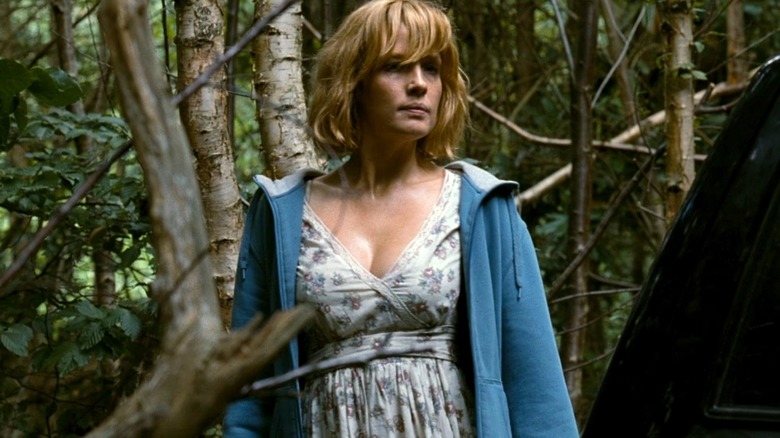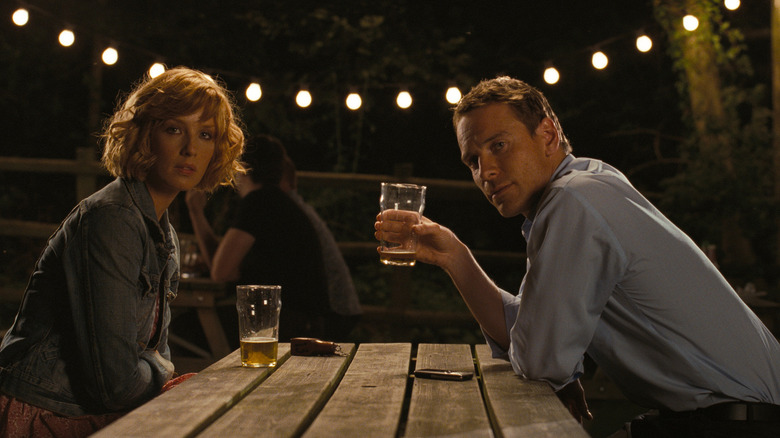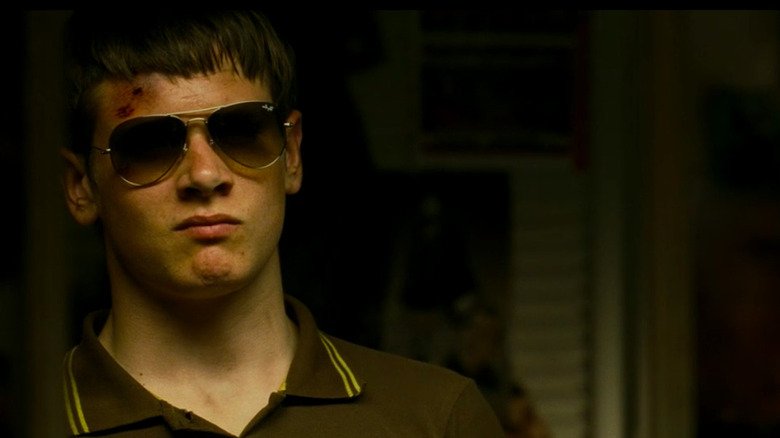The Ending Of Eden Lake Explained
We may receive a commission on purchases made from links.
Conservatism has a long history with the horror genre, so the overtly political nature of the infamous "Eden Lake" doesn't come as a surprise. Directed by James Watkins — who also helmed the disturbing remake of "Speak No Evil" – the 2008 film follows a middle class couple on a camping trip gone awry as they fight for their lives against a gang of vicious lower class teenagers.
The film isn't subtle in its portrayal of the opposing classes, nor does it stop from favoring one side over the other. What is less on the nose, though, is the way the film ends. After mean-spirited shenanigans escalate into a barbaric revenge fantasy crusaded by the callous Brett (Jack O'Connell), Steve (Michael Fassbender) is brutally killed and Jenny (Kelly Reilly) barely escapes. However, she inadvertently finds herself seeking help at Brett's family home where the parents of the other teens are having a party. When the surviving teenagers arrive, all fingers are pointed at her.
So, what happened after Jenny was confronted by the adults?
Eden Lake plays on the U.K.'s middle-class anxieties
From the beginning, the film is a commentary on "hoodies." Every character aside from the middle class duo is entitled, incessantly cruel, and feral. Conservative outlets like the Daily Mail praised "Eden Lake" for daring to criticize the dangerous youths, saying it's "willing to say what other films have been too scared or politically correct to mention."
As a result, despite Jenny's desperate attempts to explain herself, the parents side with Brett. The mothers, distraught over the deaths of their children, hang back while the fathers pull Jenny into the bathroom. Brett has been forced to go up to his room, where he can hear her muffled screams. The movie ends with Brett looking emotionlessly into the mirror, putting on the Ray-Bans he stole from Steve.
Was Jenny, who had stashed a straight razor in her dress, able to escape? It's possible, but given the film's tone, it's more likely that she didn't survive. Brett's father, Jon (Shaun Dooley), says, "We look after our own around here," implying they need to get rid of her.
Interestingly, the film doesn't explore why Steve and Jenny feel comfortable strolling into a low income area, assuming they'll receive special treatment from the locals on what they consider a quirky camping trip to the outskirts of town. They complain about the atmosphere and criticize parents for letting their children stay up late. Their characters represent the morally superior, model citizens with respectable careers — a perfect pair of victims with which viewers can sympathize.
Because of this, it wouldn't fit the film's desolate theme to allow Jenny to survive, escape, and receive justice. Instead, she becomes one of the rare final girls who doesn't survive her own movie.
Parental neglect is a vicious cycle
In any other film, Brett staring blankly at his reflection could symbolize a young man questioning what he has become. In "Eden Lake," though, that isn't the case. Moments before, Brett watches his father attack and then presumably kill a woman he spent the weekend hunting down. Everything the teenager has become is a direct reflection of his upbringing, and he's doomed to continue the cycle of being poor, angry, and a product of societal decay.
Throughout the film, the locals are characterized as crass and morally corrupt, from openly striking their kids to leaving behind a trail of broken liquor bottles. The parents are "bad" because they party, drink, smoke, and hook up in bathrooms. They don't parent their children, who consequently mimic their actions and lash out at people in their community. People like Jenny, a schoolteacher, must try to correct these behaviors and often receive nothing in return.
Brett's forceful leadership, in particular, is demonstrated by Jon in the end as he convinces the two hesitant men that they must help him take care of Jenny. He is following in his father's footsteps and carrying on a legacy of violence. In other words, Brett isn't the true villain of "Eden Lake" — it's both his father who molded him into a monster and the cyclical nature of neglect and abuse.
The bleak, realistic nature of the film is what makes the horror so palpable. "Eden Lake" is relentless through to its brutal finale. However, director James Watkins insisted to Den of Geek that he wasn't aiming to demonize the working class — he was simply exploring public fears in an extreme way.


